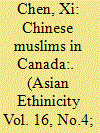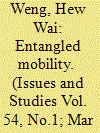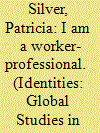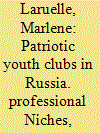|
|
|
Sort Order |
|
|
|
Items / Page
|
|
|
|
|
|
|
| Srl | Item |
| 1 |
ID:
141162


|
|
|
|
|
| Summary/Abstract |
To date, there has been little to no literature examining Chinese Muslim immigrants to Western nations. Recognizing the dearth of such literature, this research presents what appears to be the first-ever descriptive statistical picture of Chinese Muslims migrating to and residing in Canada. By examining how this immigrant population compares to and fares against non-Muslim Chinese and non-Chinese Muslims in Canada with Canadian census data in 1991 and 2001, the research provides preliminary analysis on the saliency of originating Chinese Muslim ethnicity in immigration outcomes. The current findings suggest that with the intersection of cultural and religious identities, Chinese Muslim may experience a different assimilation process compared to non-Muslim Chinese and non-Chinese Muslims.
|
|
|
|
|
|
|
|
|
|
|
|
|
|
|
|
| 2 |
ID:
160700


|
|
|
|
|
| Summary/Abstract |
In recent years, there is an increasing number of Hui migrants in Malaysia. This paper examines the accumulation of various forms of capital (cultural, social and economic) and the intersection of capitalization of “Chineseness” and “Muslimness” among overseas Hui. It begins with a discussion on the mobility capital — in which Hui Muslims enjoy relative freedom to move around in China and beyond China, compared to their Uyghur counterparts who have limited mobility. It is followed by analyzing how aspirations such as “cultural affinity,” “religious authenticity,” “educational mobility” and “business opportunity” drive contemporary Hui mobility to Malaysia. By describing the religious, cultural and business activities of Hui migrants, it explores how the accumulation and circulation of different forms of capital take place in mosques, in restaurants and on social media platforms. It proposes a concept of “entangled mobility” to examine the intersection between their cultural and religious identity, the interconnection between spatial and social mobility, the combination of religious and economic aspiration, as well as how their capital circulations are entangled with broader economic, social and political processes. However, instead of reifying cultural capital as given one, Hui migrants re-enact their cultural capital depending on the Malaysian contexts. Such enactment of cultural capital plays an important role in Hui mobility and enables them to navigate their life in multi-ethnic and multi-religious Malaysia.
|
|
|
|
|
|
|
|
|
|
|
|
|
|
|
|
| 3 |
ID:
096474


|
|
|
|
|
| Publication |
2010.
|
| Summary/Abstract |
This article examines economic and cultural capital in the lives of public school teachers in Puerto Rico across the last half of the twentieth century to examine the processes through which their class relations have formed and reformed with shifts in Puerto Rican political and economic conditions from the early days of United States rule through neoliberal school reforms of the 1990s. It traces the historical development of the "teacher class" as a female-identified, poorly paid, professional workforce, and examines the impact of class and gender ideologies in this process.
|
|
|
|
|
|
|
|
|
|
|
|
|
|
|
|
| 4 |
ID:
153352


|
|
|
|
|
| Summary/Abstract |
The relationship between sex workers and their clients is generally characterized as being based entirely on the direct exchange of sexual favours for money. However, this received wisdom cannot account for a nation such as China which attaches significant value to “face,” social status and interpersonal dignity. This paper draws parallels with high-end sex workers elsewhere in Asia as well as globally. With a focus on the high-end sector, I examine how workers and their clients engage not only in pecuniary transactions but also in genuinely intimate and non-remunerative relationships. High-end sex workers make use of their earned economic capital to acquire cultural capital, and use online apps as marketing tools to target local elites and expats to forge longer-term intimate relationships. Male clients in more commercialized, post-industrial cities in China continue to seek diverse types of sexual experiences, with some clients seeking genuine intimacy. Furthermore, I explore how Chinese and foreign clients overcome social barriers to develop such relationships with sex workers. Building on this sociocultural perspective, this paper analyses ethnographically both sides of the female sex worker–client relationship in high-end karaoke lounges and bars in Dongguan, southern China.
|
|
|
|
|
|
|
|
|
|
|
|
|
|
|
|
| 5 |
ID:
137473


|
|
|
|
|
| Summary/Abstract |
Youth civic engagement in post-socialist countries and youth enrolment in defending the current regimes or contesting them became a growing topic of research in the 2000s. This essay examines a category of largely under-studied youth social engagement in Russia: patriotic clubs for children, teenagers and young adults. These clubs do not come close to the stereotypes promoted by the state patriotic education programmes. There is a major gap between the activists' patriotic narratives and practices, and those expected by the Kremlin. The first part of the paper investigates the notion of ‘patriotic club’ as a broad umbrella that covers multiple activities and practices. Then it explores their meanings and three of their main functions, as a professional tool on the job market, a source of cultural capital, and a way to develop a depoliticised social engagement.
|
|
|
|
|
|
|
|
|
|
|
|
|
|
|
|
| 6 |
ID:
134166


|
|
|
|
|
| Publication |
2014.
|
| Summary/Abstract |
A central theme in the literature on transnational migration is the embeddedness of such movement in social networks and the utilisation of social capital in facilitating mobility. This case study on overseas Chinese students and mainly non-Chinese foreign students studying at a top university in Taipei brings in the notions of cultural capital and city. It investigates the ways social networks shape the destination choices of these two groups of students, and how their patterns of adjustment in the host milieu and attachment to the host city are affected by the transnational migration network (and the lack of it), embodied cultural capital and different host imaginaries constructed by the Taiwan government. The results show that these two groups of international students differed in their reliance on transnational migration networks in making destination choices prior to migration. Furthermore, the different forms of social networks and the differential social and cultural capital embedded in their respective groups, along with the distinctive host images that were constructed by the Taiwan government to cater for these two groups, shaped their overseas experiences and attachment to the city of Taipei in distinctive ways.
|
|
|
|
|
|
|
|
|
|
|
|
|
|
|
|
| 7 |
ID:
066641


|
|
|
|
|
|
|
|